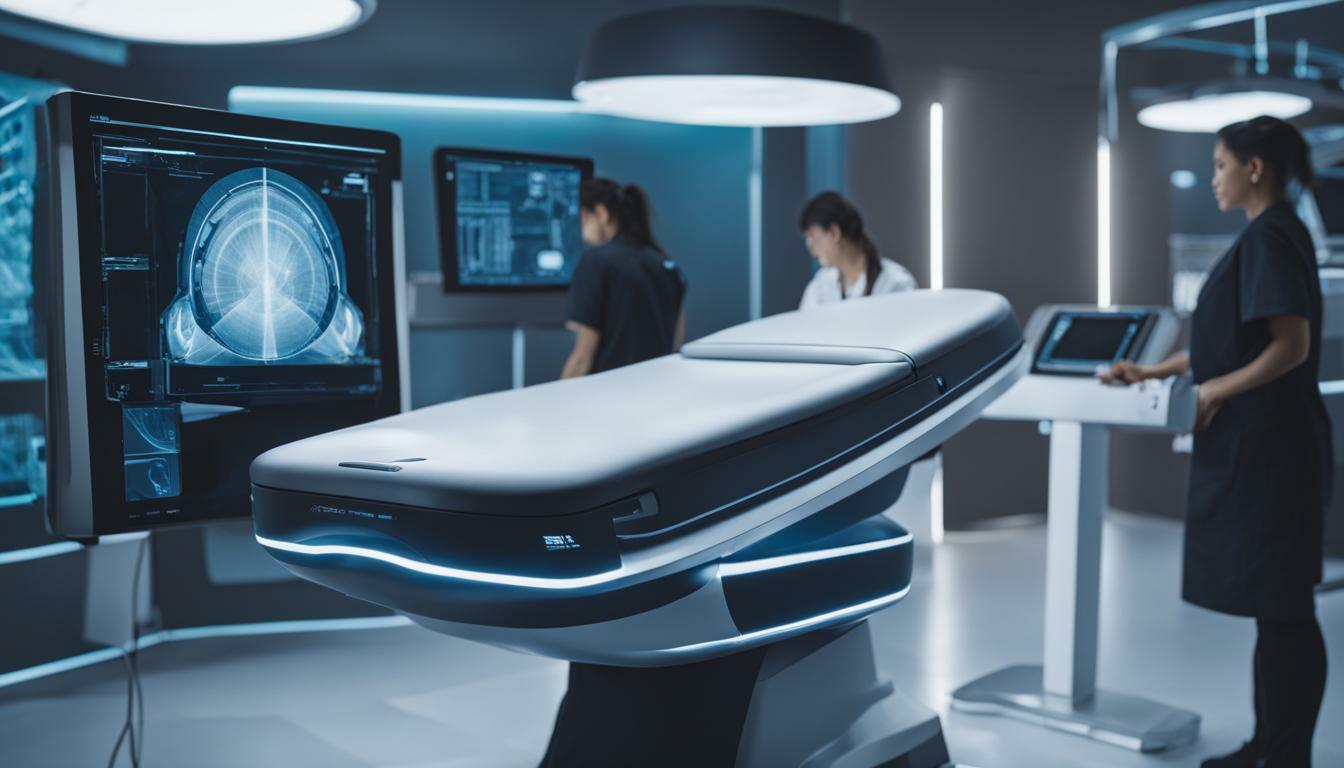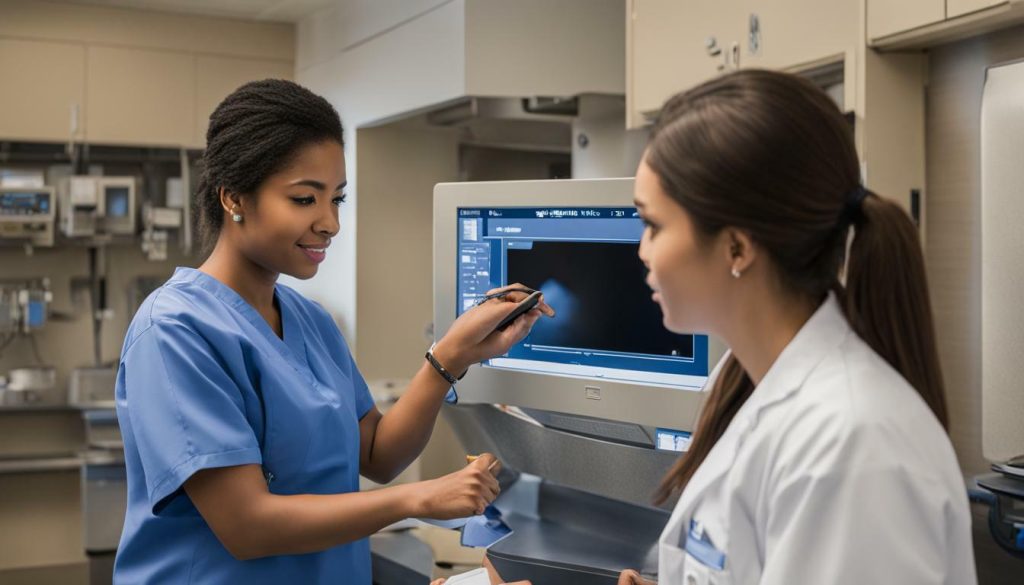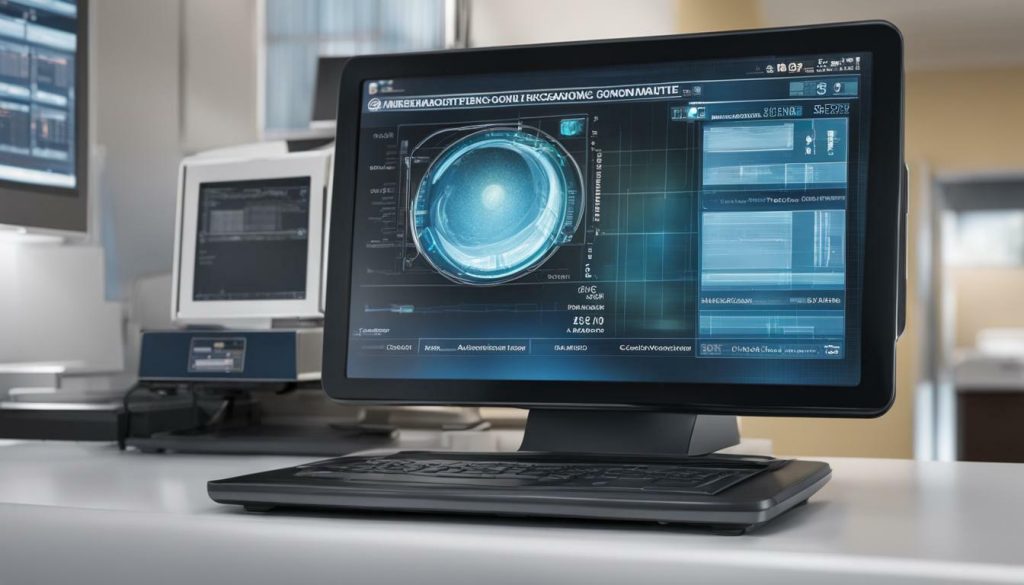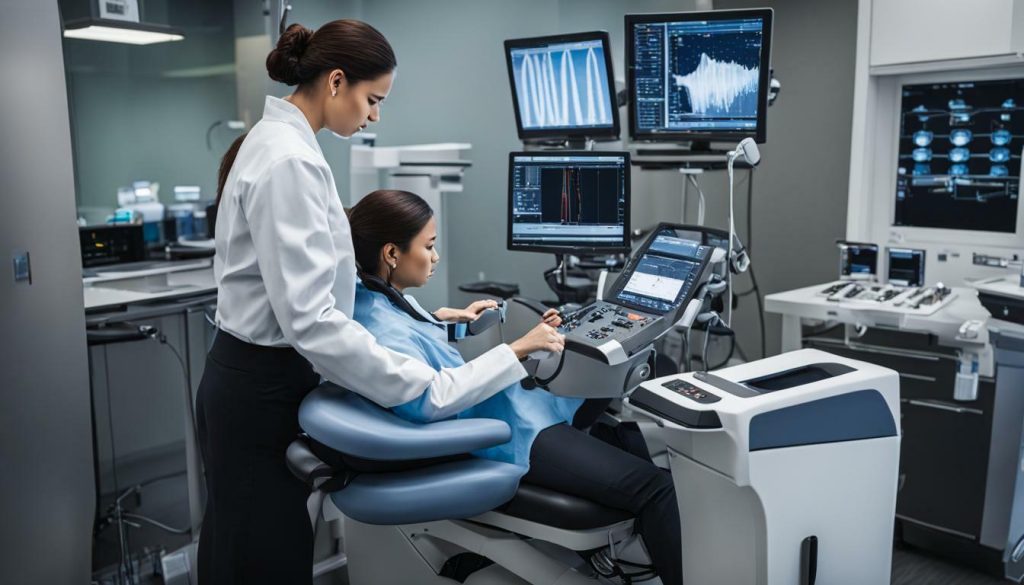
Are you considering a career as an ultrasound technician? Discover the essential tips that can help you succeed in this dynamic and rewarding field.
Key Takeaways:
- Explore different career paths within the field to decide on your desired specialization.
- Gain practical experience through high school internships and entry-level jobs to develop essential skills and knowledge.
- Obtain a bachelor’s degree in sonography from an accredited school to enhance your educational background.
- Become certified by the American Registry of Diagnostic Medical Sonographers (ARDMS) to establish credibility and ensure proficiency.
- Advance in the field by picking a specialty, pursuing further education, and expanding your role to become a manager, ultrasound researcher, or diagnostic medical sonographer.
- Continuously learn and develop excellent communication skills, as they are crucial for success in this dynamic field.
Exploring Different Career Paths as an Ultrasound Technician
Before embarking on your journey as an ultrasound technician, it’s essential to explore the various career paths available in this diverse and evolving field. Ultrasound technology offers a wide range of opportunities beyond traditional clinical settings. By understanding these different paths, you can make informed decisions about your education, certifications, and specialization.

- Ultrasound technician job prospects are promising, with a growing demand for skilled professionals in various healthcare settings.
- Obtaining ultrasound technician certification is crucial for establishing credibility and proficiency in the field.
- To become an ultrasound technician, you need to complete specialized education and training programs, which typically include coursework and clinical experience.
- Exploring different career paths within ultrasound technology can lead to opportunities in research, management, and specialized areas like obstetrics, cardiology, or vascular sonography.
- Continuous learning and developing excellent communication skills are crucial for success and career advancement as an ultrasound technician.
Gaining Experience through High School Internships and Entry-Level Jobs
High school internships and entry-level jobs provide invaluable hands-on experience for future ultrasound technicians, allowing them to develop the necessary skills and knowledge to excel in this profession. These opportunities offer a unique chance to work alongside experienced professionals and gain practical insights into the field of ultrasound technology.
During high school internships, students can observe and assist ultrasound technicians in real-world scenarios, helping them understand the intricacies of the job. They may have the chance to interact with patients, learn how to operate ultrasound equipment, and perform basic diagnostic procedures under supervision. This exposure not only enhances their technical skills but also gives them a first-hand understanding of the responsibilities and challenges that come with the profession.
Entry-level jobs, such as ultrasound aide or medical assistant positions, provide further opportunities for aspiring ultrasound technicians to refine their skills. These roles involve assisting in patient care, maintaining equipment, and scheduling appointments. Working in a clinical setting alongside experienced professionals allows them to witness diverse cases and learn how to interact effectively with patients and medical staff.
| Benefits of High School Internships and Entry-Level Jobs |
|---|
| 1. Hands-on experience in operating ultrasound equipment |
| 2. Exposure to different diagnostic procedures |
| 3. Insight into patient care and interaction |
| 4. Collaboration with experienced professionals |
| 5. Development of technical and communication skills |
“The practical experience gained through high school internships and entry-level jobs is invaluable for aspiring ultrasound technicians. It allows them to apply their theoretical knowledge in a real-world setting and develop the necessary skills and competence to succeed in their careers.”
Ultrasound Technician Training and Education
While high school internships and entry-level jobs provide a solid foundation, formal training and education programs are essential to become a certified ultrasound technician. Accredited programs, available at community colleges, vocational schools, and universities, provide comprehensive courses in ultrasound technology.
These programs cover various aspects of ultrasound imaging, including anatomy, physiology, patient care, and equipment operation. Students gain theoretical knowledge through classroom lectures and hands-on experience in simulated lab environments. Clinical practicum is also an integral part of the training, where students work with patients under the guidance of experienced professionals.
Upon completing their training and education, aspiring ultrasound technicians can pursue certification from organizations such as the American Registry of Diagnostic Medical Sonographers (ARDMS). Certification not only validates their competence but also enhances their job prospects and earning potential in this rapidly growing field.

A bachelor’s degree in sonography from an accredited institution is a key stepping stone towards a successful career as an ultrasound technician. This comprehensive program provides students with the necessary knowledge and practical skills to excel in the field of diagnostic medical sonography. Through a combination of coursework, laboratory training, and clinical rotations, aspiring ultrasound technicians gain a deep understanding of anatomy, physiology, and imaging techniques.
One of the advantages of pursuing a bachelor’s degree in sonography is the opportunity to specialize in a specific area of ultrasound technology. Students can choose from specialties such as obstetrics and gynecology, cardiovascular, abdominal, or musculoskeletal sonography. This specialization not only enhances job prospects but also allows technicians to develop expertise in their chosen area, providing them with a competitive edge in the job market.
In addition to specialized training, a bachelor’s degree in sonography equips students with a strong foundation in critical thinking, problem-solving, and effective communication skills. These skills are crucial in delivering accurate and comprehensive diagnostic reports, collaborating with healthcare professionals, and providing exceptional patient care. Graduates from accredited sonography programs are well-prepared to meet the demands of this rapidly evolving field and contribute to the advancement of medical imaging technology.
| Benefits of a Bachelor’s Degree in Sonography: |
|---|
| Specialization options |
| Comprehensive knowledge and practical skills |
| Strong foundation in critical thinking and communication |
| Improved job prospects and competitive edge |
| Contribution to the advancement of medical imaging technology |
Overall, obtaining a bachelor’s degree in sonography is an investment in one’s future as an ultrasound technician. It provides the necessary education, specialized training, and practical experience to excel in this dynamic field. With the demand for ultrasound technicians on the rise, a bachelor’s degree not only enhances job prospects but also opens the door to various career opportunities and professional growth.

Becoming Certified by the American Registry of Diagnostic Medical Sonographers (ARDMS)
Achieving certification from the American Registry of Diagnostic Medical Sonographers (ARDMS) is a vital milestone for future ultrasound technicians, as it serves as a testament to their knowledge and competency within the field. ARDMS certification is highly regarded and recognized worldwide, providing ultrasound technicians with a competitive edge in the job market.
The ARDMS offers various certification options, including the Registered Diagnostic Medical Sonographer (RDMS), Registered Diagnostic Cardiac Sonographer (RDCS), and Registered Vascular Technologist (RVT) credentials. Each certification demonstrates proficiency in specific areas of diagnostic medical sonography, allowing ultrasound technicians to specialize and enhance their career prospects.
| Certification | Specialization | Eligibility Requirements |
|---|---|---|
| RDMS | Abdomen, Breast, Fetal Echocardiography, Obstetrics and Gynecology, Pediatric Sonography | Completion of a recognized educational program and passing the ARDMS examination |
| RDCS | Echocardiography | Completion of a recognized educational program in echocardiography and passing the ARDMS examination |
| RVT | Vascular Technology | Completion of a recognized educational program in vascular ultrasound and passing the ARDMS examination |
To obtain ARDMS certification, candidates must meet the eligibility requirements specific to their chosen specialization and pass a rigorous examination. The examination evaluates their knowledge and skills in areas such as anatomy, physiology, ultrasound physics, patient care, and image interpretation.
The Benefits of ARDMS Certification
- Professional Credibility: ARDMS certification is widely recognized as a mark of excellence within the field of diagnostic medical sonography. It demonstrates to employers and patients that an ultrasound technician has met stringent standards and possesses the necessary skills to perform high-quality ultrasound examinations.
- Job Opportunities: Many employers require ARDMS certification as a prerequisite for employment. Holding an ARDMS credential opens doors to a wide range of job opportunities in hospitals, clinics, private practices, research institutions, and other healthcare settings.
- Continued Professional Development: The ARDMS requires certified ultrasound technicians to participate in continuing medical education (CME) activities to maintain their credentials. This commitment to lifelong learning ensures that technicians stay updated with the latest advancements in the field, enhancing their professional growth and expertise.
Overall, ARDMS certification is an indispensable step towards success as an ultrasound technician. It not only validates one’s knowledge and competency but also boosts credibility, expands job prospects, and fosters ongoing professional development.

The field of ultrasound technology offers numerous opportunities for growth and advancement, allowing ultrasound technicians to expand their skill set and explore exciting career paths. To further advance in this dynamic field, it is important to consider specializing in a specific area of ultrasound technology. Whether it’s obstetrics and gynecology, cardiology, or musculoskeletal, focusing on a particular specialty can open doors to specialized roles and increased job opportunities.
Continuing education is another key aspect of advancing as an ultrasound technician. Pursuing advanced certifications or completing specialized training programs can enhance expertise and increase chances of career progression. There are various educational institutions and online resources that offer advanced courses and programs tailored specifically for ultrasound technicians.
For those seeking leadership roles, transitioning into a management position can be a viable option. With experience and additional education, ultrasound technicians can take on managerial responsibilities, overseeing teams of technicians, managing budgets, and ensuring quality control. This path can lead to increased earning potential and a higher level of professional fulfillment.

Lastly, ultrasound technicians can consider expanding their roles to become ultrasound researchers or diagnostic medical sonographers. Ultrasound research involves conducting studies and contributing to advancements in the field, while diagnostic medical sonographers work closely with physicians and patients to provide crucial diagnostic information. These roles require additional training and education, but they offer unique opportunities to make a significant impact in healthcare.
| Advancement Opportunities | Description |
|---|---|
| Specializing in a specific area | Focusing on a particular specialty can open doors to specialized roles and increased job opportunities. |
| Continuing education | Pursuing advanced certifications or completing specialized training programs can enhance expertise and increase chances of career progression. |
| Transitioning into a management position | With experience and additional education, ultrasound technicians can take on managerial responsibilities, overseeing teams of technicians, managing budgets, and ensuring quality control. |
| Expanding roles as ultrasound researchers or diagnostic medical sonographers | Ultrasound research involves conducting studies and contributing to advancements in the field, while diagnostic medical sonographers work closely with physicians and patients to provide crucial diagnostic information. |
Overall, the field of ultrasound technology offers a wide range of opportunities for ultrasound technicians to grow and advance in their careers. By specializing, pursuing advanced education, exploring managerial positions, or expanding roles as researchers or diagnostic medical sonographers, ultrasound technicians can take their careers to new heights while making a meaningful impact in the healthcare industry.
Continuous Learning and Communication Skills for Success
Continuous learning and effective communication skills are vital components for ultrasound technicians, ensuring ongoing success and personal fulfillment in this dynamic and ever-evolving field.
As an ultrasound technician, staying updated with the latest advancements in technology, techniques, and research is essential to provide the highest quality patient care. By continuously learning and seeking out opportunities for professional development, you can enhance your skills, broaden your knowledge base, and stay ahead in this rapidly evolving field. Attend conferences, workshops, and seminars, and take advantage of online resources and educational courses to stay abreast of new diagnostic procedures, equipment, and industry trends.
In addition to continuous learning, excellent communication skills are instrumental in building strong relationships with patients and healthcare professionals. As an ultrasound technician, you will often be working closely with patients, doctors, and other medical staff. Clear and effective communication is crucial to accurately gather medical histories, explain procedures, and ensure patient comfort and compliance. Strong communication skills can also contribute to a positive and supportive work environment, fostering collaboration and teamwork.
Furthermore, effective communication extends beyond verbal interactions. Proficient writing skills are essential for accurately documenting patient information and test results. Additionally, having a solid understanding of medical terminology and the ability to explain complex medical concepts to patients in a clear and concise manner is crucial. By honing your communication skills, you can establish trust and rapport with patients and contribute to the overall success of the healthcare team.
FAQ
What are some essential tips for future ultrasound technician success?
Some essential tips for future ultrasound technician success include exploring different career paths within the field, gaining experience through high school internships and entry-level jobs, obtaining a bachelor’s degree in sonography, becoming certified by the American Registry of Diagnostic Medical Sonographers (ARDMS), advancing in the field through specialization and further education, and continuously learning and developing excellent communication skills.
How can I explore different career paths as an ultrasound technician?
To explore different career paths as an ultrasound technician, you can research job prospects within the field, consider specializing in a particular area of sonography, such as obstetrics or cardiovascular, and pursue additional education or certifications to expand your role and increase job opportunities.
What steps do I need to take to become a certified ultrasound technician?
To become a certified ultrasound technician, you will need to obtain a bachelor’s degree in sonography from an accredited school, complete the required clinical training, and pass the certification exam administered by the American Registry of Diagnostic Medical Sonographers (ARDMS).
Why is it important to gain experience through high school internships and entry-level jobs as an ultrasound technician?
Gaining experience through high school internships and entry-level jobs as an ultrasound technician is important because it allows you to apply your knowledge in real-world settings, develop essential skills, and gain exposure to different areas of sonography. This experience can enhance your job prospects and make you more competitive in the field.
Why should I obtain a bachelor’s degree in sonography?
Obtaining a bachelor’s degree in sonography is important because it provides you with a comprehensive education in the field, ensures that you have a strong foundation of knowledge and skills, and increases your job opportunities and earning potential as an ultrasound technician.
What is the significance of becoming certified by the American Registry of Diagnostic Medical Sonographers (ARDMS)?
Becoming certified by the American Registry of Diagnostic Medical Sonographers (ARDMS) is significant because it validates your expertise and proficiency as an ultrasound technician, establishes your credibility in the field, and can enhance your job prospects and earning potential.
How can I advance in the field of ultrasound technology?
You can advance in the field of ultrasound technology by picking a specialty, such as pediatric or musculoskeletal sonography, pursuing further education or certifications, such as a master’s degree or specialized training programs, and expanding your role to become a manager, ultrasound researcher, or diagnostic medical sonographer.
Why is continuous learning and communication skills important for success as an ultrasound technician?
Continuous learning is important for success as an ultrasound technician because the field is constantly evolving, and staying updated with the latest advancements and techniques is crucial. Additionally, strong communication skills are essential to effectively interact with patients and healthcare professionals, ensure accurate diagnoses, and provide high-quality patient care.



